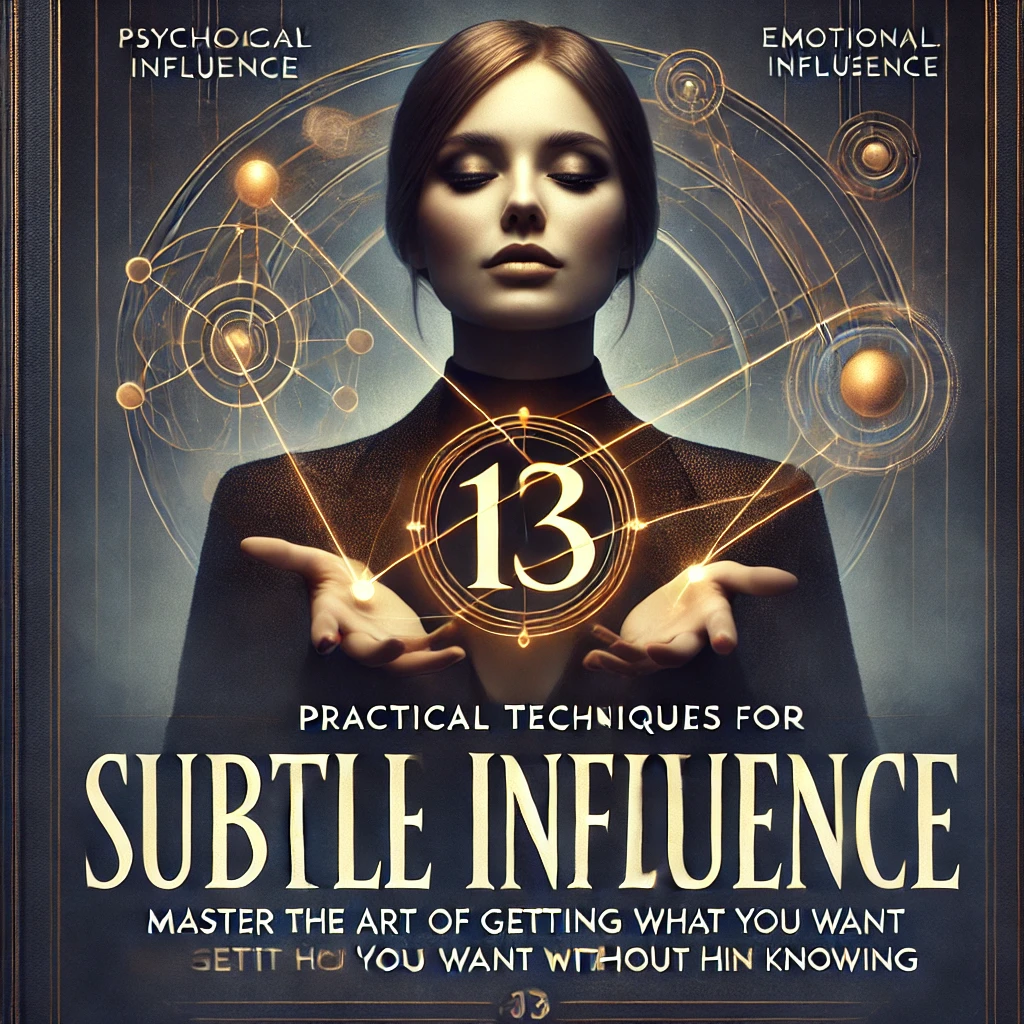They say the best kind of influence is the kind you don’t see coming. And in Chapter 5 of “Mastering Him: The Secret Art of Gentle Control in Relationships,” the book reveals 13 practical techniques for subtly steering your partner without raising suspicion. This isn’t about nagging or begging. It’s about becoming the silent force behind every decision, every choice, and every outcome in your relationship. If you’ve ever wished you could gently guide your partner to do what you want without the push back or conflict, this chapter is your blueprint.
Here’s the controversial part: these techniques work. Not because they’re manipulative in the toxic sense, but because they leverage emotional intelligence and psychological triggers that are already in play in every relationship. Most women try to influence their partner through obvious hints or direct confrontation—and that’s exactly why it doesn’t work. The moment your partner feels pressured, their defenses go up. But these 13 techniques? They slide right under the radar. By the time he realizes he’s agreed to your suggestion, he’ll be convinced it was his idea all along.
13 Techniques That Master Influence (Without Manipulation)
In Chapter 5, “Mastering Him” reveals these techniques in detail, and each one is designed to help you influence your partner without causing friction. Let’s dive into a few of them:
1. The Power of Suggestion
You’ve heard it before—plant the idea and watch it grow. But “Mastering Him” takes this further by showing how to weave suggestions into conversations in a way that feels natural to him. You’re not telling him what to do; you’re letting the seed of your idea settle into his mind so it feels like it bloomed there on its own.
Example: Want him to commit to a weekend getaway? Instead of asking directly, casually mention how much you love the idea of a spontaneous trip and leave it at that. He’ll eventually come back to you with the idea, thinking it was his brainchild.
more on “The Power of Suggestion”: https://developmentpill.com/the-power-of-suggestion-how-to-influence-without-ever-asking/
2. The Compliment Sandwich
This technique is subtle but powerful. By sandwiching your request between two compliments, you soften the delivery and make your partner more receptive to your suggestion.
Example: “You’ve been so amazing with handling the bills. Would you mind taking over the budgeting too? I just know you’ll do a great job with it.”
more on “The Compliment Sandwich”: https://developmentpill.com/the-compliment-sandwich-the-secret-to-getting-what-you-want-without-conflict/
3. The Illusion of Choice
Nobody likes being told what to do. The trick here is giving him the illusion of choice—offering two options that both lead to the same result you want. That way, no matter what he chooses, it’s a win for you.
Example: “Would you rather take a relaxing walk or spend some time watching that new series together?” Both options are quality time together, but he feels like he’s in control.
more on “The Illusion of Choice”: https://developmentpill.com/the-illusion-of-choice-how-to-influence-your-partner-without-them-knowing/
4. The Slow Build
This technique is all about patience and incremental steps. Instead of dropping a big request all at once, break it down into smaller, manageable parts. Over time, he’ll end up where you want him to be, without even realizing how he got there.
Example: Want him to take more responsibility at home? Start small—ask for help with one small task. Gradually add more until he’s taken over larger parts of household management.
more on “The Slow Build”: https://developmentpill.com/the-foot-in-the-door-technique-how-small-requests-lead-to-big-results-in-relationships/
5. Mirroring
One of the most subtle forms of influence is mirroring—reflecting his behaviors and emotional state back to him. When you mirror someone, it creates a sense of comfort and rapport, making them more likely to agree with you.
Example: If he’s in a relaxed and open mood, adopt the same demeanor before making your request. It will feel more natural and less like an ask.
more on “Mirroring”: https://developmentpill.com/pacing-and-leading-the-subtle-art-of-guiding-your-partners-behavior-without-them-knowing/
6. The Emotional High
People are more likely to agree to requests when they’re in a good mood. Use this to your advantage by timing your suggestions when he’s on an emotional high.
Example: After a fun date night or a shared victory (like him finishing a project), bring up that new idea you’ve been wanting to discuss. The positive emotion will make him more open to saying yes.
more on “Emotional High”: https://developmentpill.com/pacing-and-leading-the-subtle-art-of-guiding-your-partners-behavior-without-them-knowing/
7. The “What If” Scenario
This technique lets you influence your partner by framing your suggestion as a possibility rather than a request. It keeps things hypothetical, which reduces pressure while still planting the idea.
Example: “What if we tried that new restaurant this weekend? I’ve heard it’s amazing.” There’s no direct ask, but the idea is subtly placed in his mind.
more on “The “What If” Scenario“: https://developmentpill.com/framing-requests-as-joint-decisions-the-key-to-getting-what-you-want-without-conflict/
8. Strategic Silence
Sometimes, the most powerful thing you can say is nothing at all. Silence gives your partner space to reflect on what you’ve said and often leads them to agree just to fill the gap.
Example: After making a suggestion, simply stop talking. The silence will prompt him to think—and often agree—without you needing to push further.
more on “Strategic Silence”: https://developmentpill.com/silent-influence-the-power-of-strategic-silence-in-relationships/
9. The “You’re Right” Technique
This technique flips things by starting with agreement before making your ask. When you acknowledge their point of view first, it lowers defenses and makes them more open to your influence.
Example: “You’re right, we’ve been really busy lately. That’s why I think a weekend trip would be the perfect way to recharge.”
more on “The “You’re Right” Technique“: https://developmentpill.com/pacing-and-leading-the-subtle-art-of-guiding-your-partners-behavior-without-them-knowing/
10. The Reciprocity Rule
Reciprocity is powerful. When you do something for him, he’ll feel a natural inclination to return the favor. Use this principle strategically to influence him.
Example: Plan something special for him, then casually mention something you’d like in return. He’ll feel almost obligated to say yes.
more on “The Reciprocity Rule“: https://developmentpill.com/the-power-of-reciprocity-how-to-influence-your-partner-by-giving-first/
11. The Social Proof Trick
People are more likely to agree with something if they believe others are doing it too. Bring up examples of friends, family, or even celebrities who have done what you’re suggesting.
Example: “I saw on Instagram that Sarah and Mike took a spontaneous trip last weekend. Doesn’t that sound fun?”
more on “The Social Proof Trick“: https://developmentpill.com/the-anchoring-effect-how-to-steer-your-partners-decisions-without-them-realizing/
12. The “I Need Your Help” Appeal
Appealing to your partner’s desire to feel needed is an easy way to influence him. By asking for help, you make him feel important, which makes him more willing to comply.
Example: “I really need your advice on how to handle this situation at work. Could we talk about it later tonight?” This opens the door to a conversation where he’s already primed to help and agree.
more on “The “I Need Your Help” Appeal“: https://developmentpill.com/the-door-in-the-face-technique-how-big-requests-can-lead-to-getting-exactly-what-you-want-in-relationships/
13. Positive Reinforcement
The most powerful influence technique is to reward the behavior you want to see repeated. Positive reinforcement ensures that your partner is more likely to continue the behaviors that make you happy.
Example: “I really appreciate how you’ve been helping out more around the house lately—it means so much to me.” He’ll be motivated to keep doing it because it makes him feel valued.
more on “Positive Reinforcement“: https://developmentpill.com/the-power-of-positive-reinforcement-how-to-shape-your-relationship-with-encouragement/
Why These Techniques Work?
These 13 techniques work because they don’t come across as demands or ultimatums. Instead, they feel natural, comfortable, and in many cases, invisible. Your partner will never know you’ve guided them, but they’ll feel good about the decisions they’ve made—because in their mind, it was their decision. That’s the beauty of subtle influence.
These techniques are practical, and once you’ve mastered them, you’ll find that you don’t need to fight for what you want. You’ll get it—easily, and without drama. “Mastering Him” shows you how to create harmony in your relationship by becoming the subtle force behind every choice.
Q&A:
- What are subtle ways to influence my partner without direct confrontation?
Techniques like suggestion, the compliment sandwich, and strategic silence allow you to guide your partner without confrontation. These methods help you plant ideas, make requests, and steer decisions gently, reducing the likelihood of resistance. - How can I use the power of suggestion to influence my partner?
The power of suggestion involves planting an idea casually, letting it settle naturally in your partner’s mind. For example, mention how much fun a weekend getaway sounds instead of directly asking—this way, they’re more likely to consider it as their own idea. - What is the compliment sandwich, and how does it help in relationships?
The compliment sandwich involves framing a request or critique between two positive statements. By starting and ending with appreciation, you make your partner feel valued, making them more receptive to your suggestion. - How does the “illusion of choice” technique work in relationships?
The illusion of choice gives your partner a sense of control by offering options that both lead to a favorable outcome. For example, asking, “Would you rather go for a walk or watch a movie together?” ensures quality time either way. - What is mirroring, and why is it effective in influencing my partner?
Mirroring involves reflecting your partner’s behavior or emotional state, creating a sense of rapport and comfort. By adopting their demeanor, they feel more connected and are naturally more open to your requests. - How can I use strategic silence to influence my partner?
After making a suggestion, pause and let silence do the work. The silence creates space for reflection, often leading your partner to agree or come to the conclusion on their own without needing to be pushed. - What is positive reinforcement, and how can it improve my relationship?
Positive reinforcement is about acknowledging and rewarding behaviors you want to see more of. For example, thanking your partner when they help out with chores encourages them to continue because they feel appreciated. - How does the “what if” scenario work as a subtle influence technique?
The “what if” scenario frames an idea as a hypothetical rather than a direct ask. Saying, “What if we tried a new restaurant this weekend?” makes it feel like a casual thought, planting the idea without any pressure. - How does the “I need your help” appeal influence a partner?
Asking for help appeals to your partner’s desire to feel needed, making them more inclined to assist you. Saying, “I need your advice on something” makes them feel important, priming them to support your request. - What is the reciprocity rule, and how can I use it with my partner?
The reciprocity rule suggests that when you do something thoughtful for your partner, they’ll feel inclined to return the favor. Use it strategically by offering a small act of kindness, and later mention something you’d appreciate in return.
Ready to Master Subtle Influence?
If you’re done with the frustration of not being heard or getting what you want, “Mastering Him: The Secret Art of Gentle Control in Relationships” is your guide. Chapter 5 lays out these 13 practical techniques for subtly influencing your partner, making sure you get what you want without the conflict or resistance.
Buy your copy today and start mastering the art of influence. It’s time to take control—without him ever knowing.
Read more about the book: https://developmentpill.com/mastering-him-the-secret-art-of-gentle-control-in-relationships-a-guide-to-influence-hell-never-see-coming/
Book Link: https://www.amazon.com/dp/B0DKKGLZQ9
Book Link UK: https://www.amazon.co.uk/dp/B0DKKGLZQ9
You can find book Links for other regions in this post page: https://developmentpill.com/mastering-him-the-secret-art-of-gentle-control-in-relationships-a-guide-to-influence-hell-never-see-coming/



